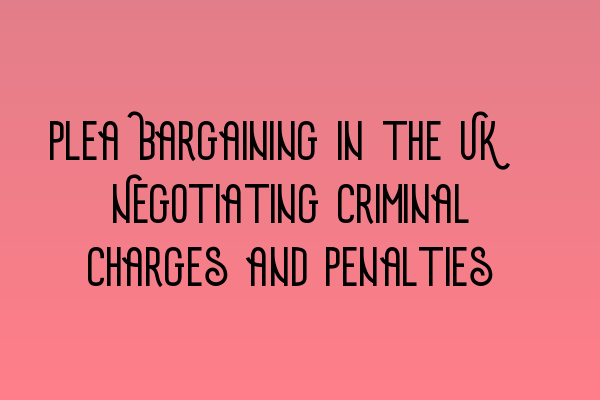Plea Bargaining in the UK: Negotiating Criminal Charges and Penalties
At SQE Criminal Law & Practice Law UK, we understand the complexities and challenges involved in the criminal justice system. One important aspect that individuals accused of criminal offences need to be aware of is plea bargaining. Plea bargaining allows defendants to negotiate with the prosecution to reach a mutually agreeable resolution.
Before diving into the details of plea bargaining, let’s briefly address the related articles for further insights:
- SQE 1 Practice Exam Questions
- SQE 1 Practice Mocks FLK1 FLK2
- SQE 2 Preparation Courses
- SQE 1 Preparation Courses
- SRA SQE Exam Dates
Understanding Plea Bargaining
Plea bargaining is a negotiation process in criminal cases where the defendant, through their solicitor, agrees to plead guilty in exchange for certain concessions from the prosecution. These concessions may include reduced charges, lesser sentences, dropped charges, or other favorable outcomes.
It’s essential to note that plea bargaining is not a standard practice in the UK justice system. However, it is still used on a discretionary basis, mainly to achieve efficiency, speed up the legal process, and prioritize more serious cases.
Advantages of Plea Bargaining
Plea bargaining offers several advantages for both defendants and the prosecution:
- Reduced Charges: Defendants who opt for plea bargaining may have their charges reduced to less serious offenses, resulting in lighter penalties.
- Lower Sentences: In some cases, defendants might receive more lenient sentences than if they had gone to trial and been convicted.
- Efficiency: Plea bargaining allows for a quicker resolution of cases, alleviating the burden on the court system.
- Cost Savings: By opting for plea bargaining, defendants can save on legal costs associated with a lengthy trial.
Disadvantages of Plea Bargaining
While plea bargaining presents benefits, it also has certain drawbacks:
- Loss of Trial: Defendants who agree to plea bargains waive their right to a trial, potentially missing out on opportunities for acquittal.
- Limited Control: Defendants have limited control over the outcome as they rely on negotiations with the prosecution.
- Public Perception: Plea bargaining can carry a negative public perception, as some individuals see it as a way for guilty parties to avoid proper punishment.
The Role of a Skilled Solicitor
When considering plea bargaining, having a skilled solicitor who specializes in criminal law is crucial. A knowledgeable solicitor can assess the strength of the case, negotiate effectively with the prosecution, and weigh the advantages and disadvantages of plea bargaining.
At SQE Criminal Law & Practice Law UK, our solicitors are well-versed in navigating the intricacies of the criminal justice system and can provide expert guidance on plea bargaining.
Conclusion
Plea bargaining can be a viable option for defendants facing criminal charges in the UK. While it is not guaranteed in every case, understanding the process and potential benefits and drawbacks is essential. A skilled solicitor can provide valuable advice and representation to ensure the best possible outcome.
If you’re preparing for a career in criminal law or seeking additional resources on related topics, be sure to check out these articles:
